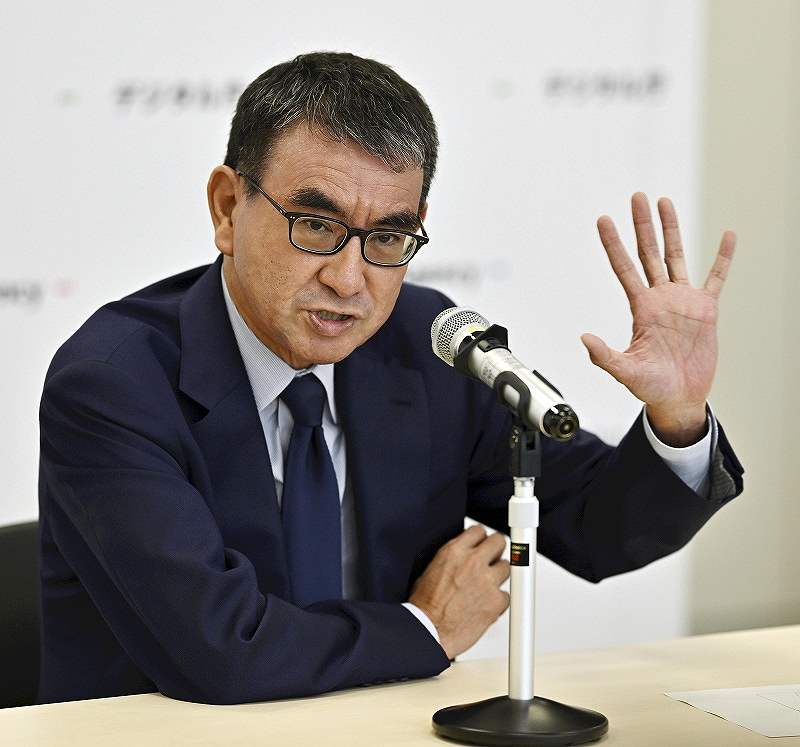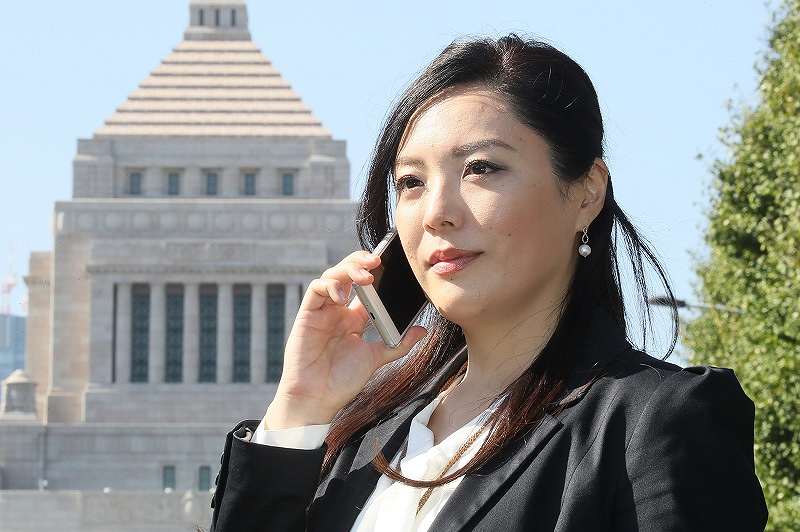
Taro Kono expresses his desire to tackle personnel management issues after being appointed as minister in charge of civil service reform in August.
8:00 JST, November 12, 2022
“Black company” is a term used in Japan to describe a business that abuses its employees, especially through chronic overwork. It’s not just a private-sector problem. Even the Japanese government bureaucracy has been described as a “black work environment.”
Can Taro Kono, the minister in charge of civil service reform, dispel the darkness that has long enveloped workers in Kasumigaseki?
Kasumigaseki is a district in Tokyo that is home to many central government offices, but the name also refers to the entire national bureaucracy. Although the primary job of Kasumigaseki bureaucrats is implementing policy, they must also prepare drafts of answers for the prime minister and cabinet ministers to use in Diet committee meetings. Long working hours that frequently stretch late into the night have become the norm. The “blackening of Kasumigaseki” is progressing.
According to the Cabinet Bureau of Personnel Affairs, the number of career officials in their 20s who resigned for personal reasons in fiscal 2019 was 86, four times as many as in fiscal 2013. In addition, according to a survey of national civil servants last fiscal year, one in seven young male employees and one in nine female employees were contemplating resignation. Also, the number of university students aspiring to work as bureaucrats is decreasing.
Preparing drafts of answers is one of the biggest causes of long working hours. Bureaucrats in charge of liaising with the Diet ask legislators about the content of likely questions and then allocate the questions to relevant departments for the formulation of draft answers. Although the ruling and opposition parties agree that ministries and agencies are to be given notice of questions “no later than noon two days before the plenary session or committee meeting,” there are many cases in which this standard is not followed.
According to a survey by the Cabinet Bureau of Personnel Affairs, the average time for notice to be given at ministries and agencies during the 2020 extraordinary Diet session was 6:46 p.m. the day before. This is well after the official 6:15 p.m. end of standard working hours. More than 60% of the cases were after 6:15 p.m., and nearly 40% were after 8 p.m. Since the preparation of the drafts begins from this point, it is inevitable for bureaucrats to work from the middle of the night to early morning.
When extraordinary incidents such as the coronavirus pandemic or the crisis in Ukraine occur, the ministries and agencies in charge must be on duty 24 hours a day. Following Russia’s invasion of Ukraine at the end of February, the Foreign Ministry confronted a surge of work to implement economic sanctions and protect Japanese nationals. On March 8, Hideki Uyama, then director of the European Affairs Bureau in charge of Russia and Ukraine, emphasized the harsh reality at the House of Councillors Committee on Foreign Affairs and Defense, saying, “Since Japan is trying hard to introduce further sanctions on Russia in rapid succession, we are working without sleep or rest.”
Moreover, Kasumigaseki is often rocked by the government’s sudden policy changes. On Aug. 10, for example, Prime Minister Fumio Kishida abruptly reshuffled his Cabinet — upending widespread expectations that the reshuffle would take place in September. This move, coming just a few days before the summer Obon holidays, caused dejection among bureaucrats. As it was obvious that ministries and agencies would become extremely busy briefing the new ministers on their duties after the reshuffle, many bureaucrats had no choice but to give up their summer holidays.
In this kind of job, it is inevitable to work overtime or on days off. According to a Cabinet Bureau of Personnel Affairs survey two years ago on the working styles of about 50,000 government employees, about 30% of career-track bureaucrats in their 20s were working more than 80 hours of overtime per month, a level regarded as “the karoshi line,” referring to the literal risk of death from overwork.
A Japanese government official formerly stationed in Britain recalls that even during the Iraq War, most of the lights at the Ministry of Defense in Whitehall — the Kasumigaseki of London — were turned off at around 6 p.m. “The longer the war was prolonged, the more I realized that it is impossible to force the staff to work without taking a rest. It was surprising to me that even in the midst of war they are encouraged to work rationally in the U.K.,” he said.
In August this year, a minister who is determined to reform the situation took a seat in the Cabinet once again. Taro Kono was appointed as the minister in charge of civil service reform for the third time. He expressed a sense of crisis at a Sept. 20 press conference at the Japan Press Club.
“In Kasumigaseki, there’s more than just a sign of collapse. The collapse has already begun. We must work hard to retain excellent human resources and to make Kasumigaseki a ‘white’ work environment.”
Last year, Kono already achieved some improvement in Kasumigaseki during his second term as minister: He changed the long-neglected practice of “unpaid overtime” so that overtime pay is now likelier to be commensurate with the overtime hours actually worked. This year, he got off to a fast start immediately after taking office for the third time. In a Sept. 30 blog post, he revealed that he had given instructions to all ministries and agencies that they should consider staff’s overtime pay even when they are working from home.
This spring, a review team of eight people in their 30s from the National Personnel Authority and the Cabinet Bureau of Personnel Affairs compiled a proposal for Kasumigaseki reform and handed it to the president of the National Personnel Authority and the then minister in charge of civil service reform. The proposal advocates reforms such as 360-degree personnel evaluations and new commitments with the Diet to handle the drafting of answers more smoothly.
The title of the proposal is “Aiming for Colorful Public Service.” Let’s see what color Kono’s latest efforts can bring to Kasumigaseki in the near future.
Political Pulse appears every Saturday.

Yukiko Ishikawa
Ishikawa is a staff writer in the Political News Department of The Yomiuri Shimbun.
Top Articles in Editorial & Columns
-

Riku-Ryu Pair Wins Gold Medal: Their Strong Bond Leads to Major Comeback Victory
-

Reciprocal Tariffs Ruled Illegal: Judiciary Would Not Tolerate President’s High-Handed Approach
-

China Provoked Takaichi into Risky Move of Dissolving House of Representatives, But It’s a Gamble She Just Might Win
-

Japan’s Plan for Investment in U.S.: Aim for Mutual Development by Ensuring Profitability
-

Flu Cases Surging Again: Infection Can Also Be Prevented by Humidifying Indoor Spaces
JN ACCESS RANKING
-

Producer Behind Pop Group XG Arrested for Cocaine Possession
-

Japan PM Takaichi’s Cabinet Resigns en Masse
-

Man Infected with Measles Reportedly Dined at Restaurant in Tokyo Station
-

Israeli Ambassador to Japan Speaks about Japan’s Role in the Reconstruction of Gaza
-

Videos Plagiarized, Reposted with False Subtitles Claiming ‘Ryukyu Belongs to China’; Anti-China False Information Also Posted in Japan
























